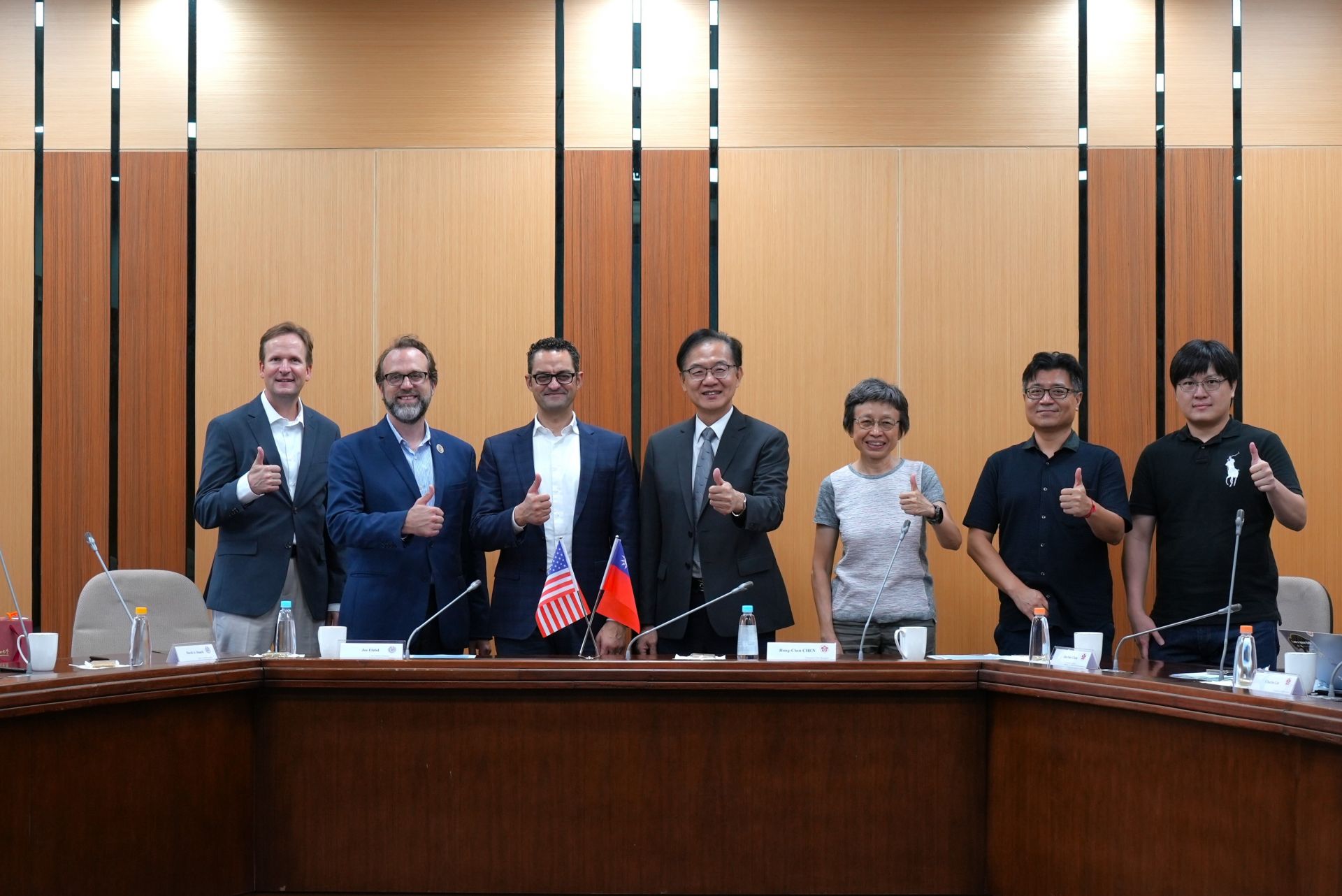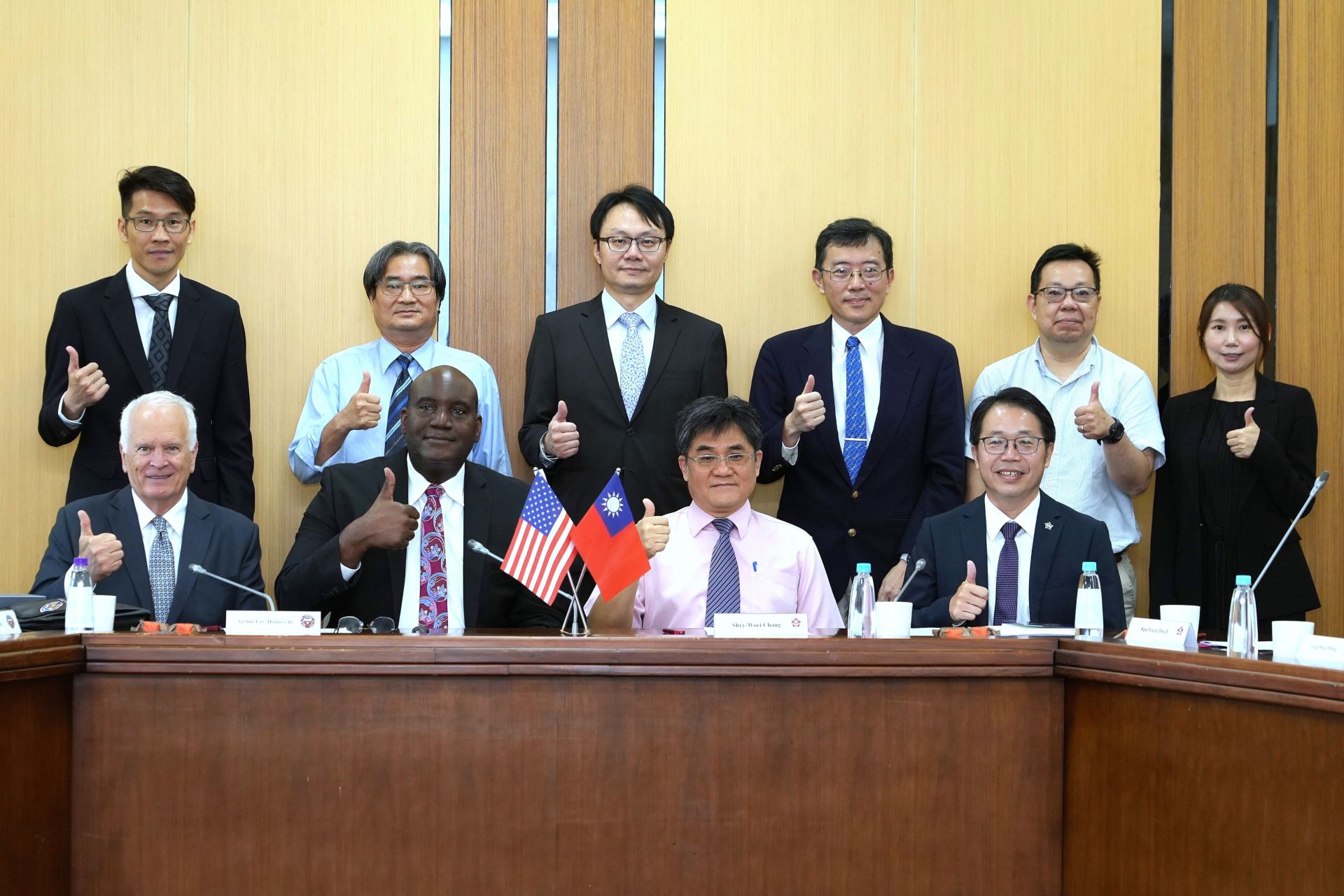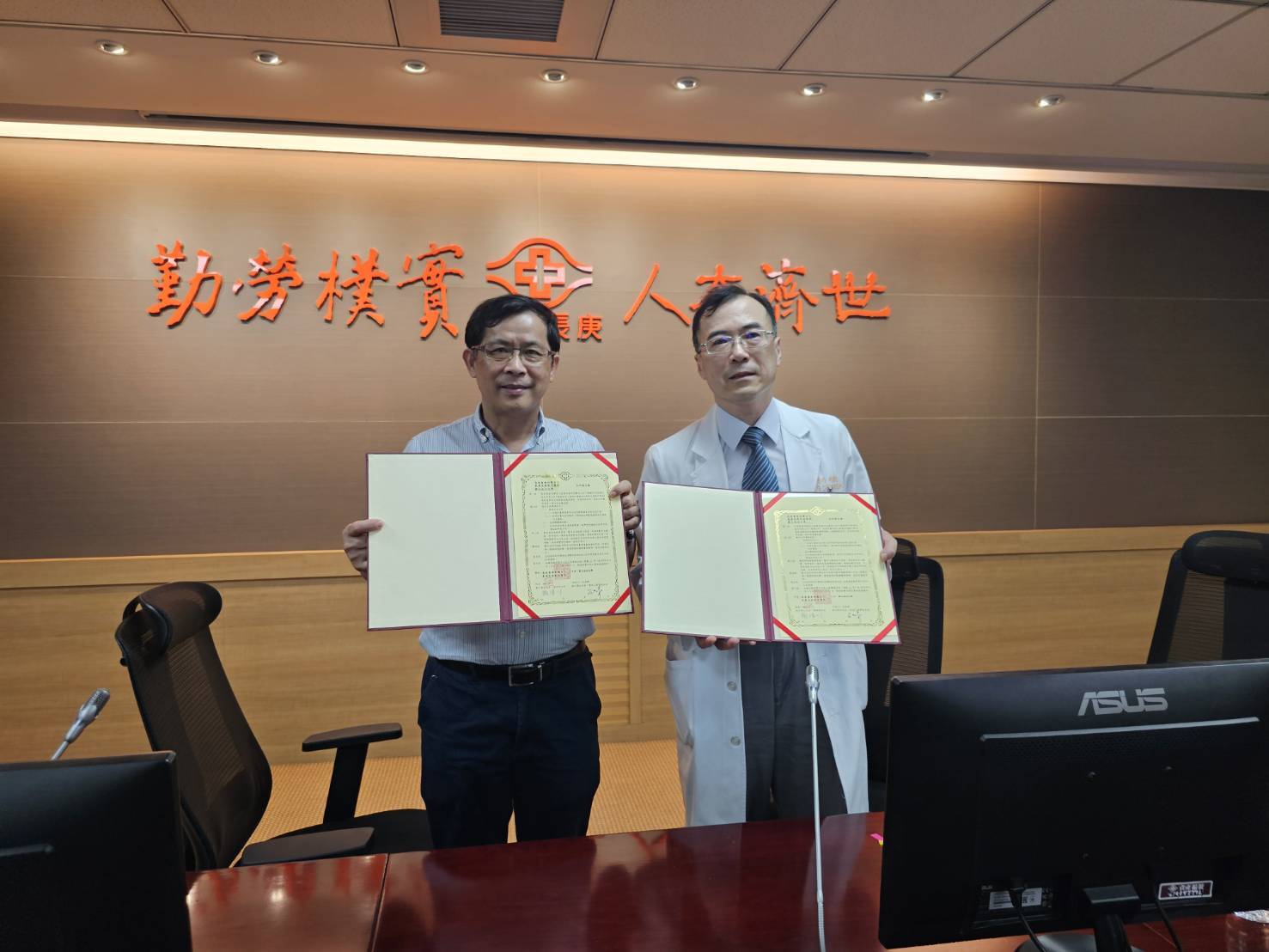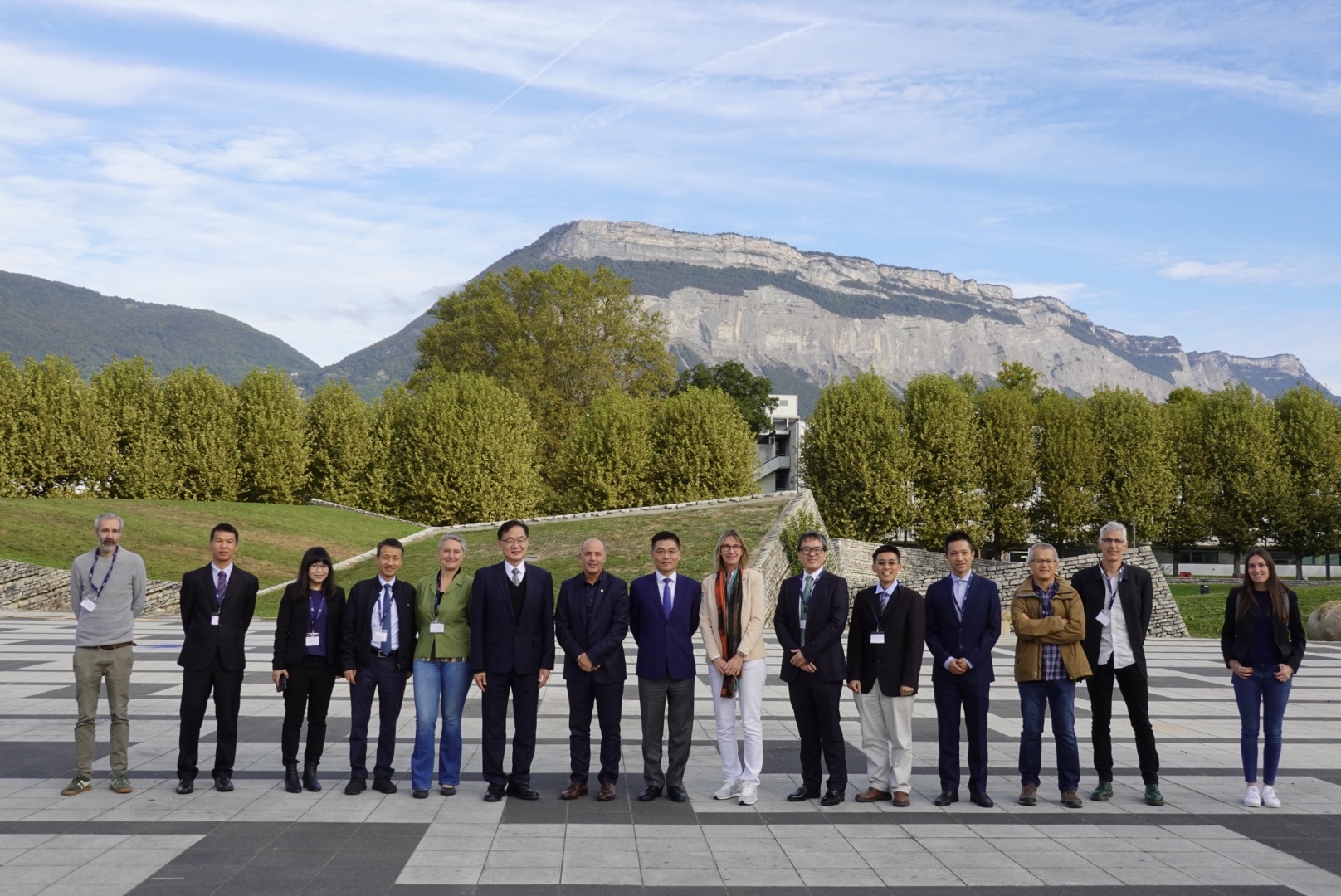SDG17
NCKU And Texas A&M University System Exchange Views on Semiconductors and Astronomy Technologies
Written by NCKU Office of Internation Affairs. Image credit to NCKU News Center.
Texas A&M University System (TAMUS) is one of the largest higher education systems in the United States, consisting of 11 universities and 8 state institutions. Through the Ministry of Education’s University Academic Alliance in Taiwan (UAAT), National Cheng Kung University signed the Memorandum of Understanding on Academic Collaboration with the TAMUS in 2023 and has developed research collaborations since then. On September 20, 2024, delegates from Texas A&M University System: Dr. Joe Elabd, Vice Chancellor for Research, Dr. David A. Staack, Deputy Vice Chancellor for Research, and Dr. E. Steve Putna, Director of the Semiconductor Institute, accompanied by Ms. Tina Ou from the Education Attaché, Ministry of Education, visited NCKU. The two institutions exchange views on fields of semiconductors and astronomy technologies.
NCKU’s Executive Vice President Hong-Chen Chen mentioned that NCKU was honored to sign the MoU with the Texas A&M University System last year (2023), to expand research fields jointly, which aligns with the cooperative strategies of the Taiwan and US governments, and promote future educational exchanges. The three major areas of research collaboration between UAAT and TAMUS are semiconductors, astronomy technologies, and agriculture. As a member of UAAT, NCKU has also submitted its research proposal for the field of astronomy technologies. Apart from UAAT, the two institutions have also co-authored 156 articles, mainly in physics and astronomy, earth science, engineering, etc. EVP Chen looks forward to promoting more academic exchanges between the two parties through further collaboration.
Vice Chancellor for Research of the Texas A&M University System, Dr. Elabd, said that despite hearing about Taiwan’s achievements in several fields in the past, this is his first visit to Taiwan, and he hopes to have a deeper understanding of NCKU through this opportunity. He also pointed out that the two institutions have many overlapping key research areas. The two large-scale projects respectively on the moon and Mars that the TAMUS is going to conduct, for example, could be one of the future collaborations.
Assoc. Prof. Chia-Hsiang Lin, Director of International Relations Division, Office of International Affairs gave the TAMUS guests an introduction to NCKU’s history and recent highlights on academic research, including the remarkable performances in the Sustainable Development Goals (SDGs) as well as NCKU’s two featured colleges: Miin Wu School of Computing and Academy of Innovative Semiconductor and Sustainable Manufacturing (AISSM). Director Lin also pointed out NCKU’s academia-industry-government cooperation achievements with Taiwan Semiconductor Manufacturing Company Limited (TSMC), Taiwan Semiconductor Research Institute (TSRI), NCKU Hospital, and leaders in various fields.
Followed was Dr. Staack, Deputy Vice Chancellor for Research of the Texas A&M University System, who introduced the overall system, including its 11 schools and 8 state agencies with their respective feature and expertise. He specifically mentioned TAMUS' leading position in the engineering field in the United States. Dr. Putna, Director of the Semiconductor Institute, also introduced the distinguishing features of the college, including the powerful R&D facilities and capacity, as well as the unique Texas A&M Research Ecosystem. He also mentioned that the Texas Chips Act which was passed in 2023 will help shift more resources and funds for research.
Prof. Jan-Sue Chen, Associate Dean of the Academy of Innovative Semiconductor and Sustainable Manufacturing (AISSM), provided a thorough overview of AISSM's attributes and capabilities, highlighting its five main degree programs, extensive industry resources, and business partnerships. She also drew instances of recent academic highlights and industry-academia cooperation to explain why NCKU is the heart of the High-Tech Corridor of the Grand South. She also shared about the diverse international exchanges in AISSM, and further mentioned that initially established on its engineering profession, the NCKU has cultivated numerous leaders and talents of the industry, simultaneously obtaining various corporate resources. Associate Dean Chen looks forward to seeing increased collaboration and exchanges between NCKU and the Texas A&M University system.
Distinguished Professor Charles Lin of the Dept. of Earth Sciences, NCKU shared that, NCKU’s space research team is distributed in multiple units such as the College of Engineering, the College of Science, and the College of Electrical Engineering. He also explained the origin of NCKU’s Han-Min Hsia Space Science and Technology Center, along with the national space missions it has helped launch, including the Formosat -2 and -3, which were completed, the ongoing Formosat-7, and the upcoming Formosat-8A and -9. Dist. Prof. Lin also mentioned the innovative breakthroughs of UAAT and TAMUS’ collaborative project, which NCKU participates in: “Quantum AI and Convex Algorithm for Optical Satellite Anomaly Detection” (TAMUS PI: Prof. Reza Langari, Dept. of Mechanical Engineering, Texas A&M University; UAAT PI: Assoc. Prof. Chia-Hsiang Lin, Dept. of Electrical Engineering, NCKU). He added that there are many research projects in the space field that the two institutions could have in-depth cooperation and exchanges.
Provider: NCKU News Center
Date: 2024-09-30
Texas A&M University System (TAMUS) is one of the largest higher education systems in the United States, consisting of 11 universities and 8 state institutions. Through the Ministry of Education’s University Academic Alliance in Taiwan (UAAT), National Cheng Kung University signed the Memorandum of Understanding on Academic Collaboration with the TAMUS in 2023 and has developed research collaborations since then. On September 20, 2024, delegates from Texas A&M University System: Dr. Joe Elabd, Vice Chancellor for Research, Dr. David A. Staack, Deputy Vice Chancellor for Research, and Dr. E. Steve Putna, Director of the Semiconductor Institute, accompanied by Ms. Tina Ou from the Education Attaché, Ministry of Education, visited NCKU. The two institutions exchange views on fields of semiconductors and astronomy technologies.
NCKU’s Executive Vice President Hong-Chen Chen mentioned that NCKU was honored to sign the MoU with the Texas A&M University System last year (2023), to expand research fields jointly, which aligns with the cooperative strategies of the Taiwan and US governments, and promote future educational exchanges. The three major areas of research collaboration between UAAT and TAMUS are semiconductors, astronomy technologies, and agriculture. As a member of UAAT, NCKU has also submitted its research proposal for the field of astronomy technologies. Apart from UAAT, the two institutions have also co-authored 156 articles, mainly in physics and astronomy, earth science, engineering, etc. EVP Chen looks forward to promoting more academic exchanges between the two parties through further collaboration.
Vice Chancellor for Research of the Texas A&M University System, Dr. Elabd, said that despite hearing about Taiwan’s achievements in several fields in the past, this is his first visit to Taiwan, and he hopes to have a deeper understanding of NCKU through this opportunity. He also pointed out that the two institutions have many overlapping key research areas. The two large-scale projects respectively on the moon and Mars that the TAMUS is going to conduct, for example, could be one of the future collaborations.
Assoc. Prof. Chia-Hsiang Lin, Director of International Relations Division, Office of International Affairs gave the TAMUS guests an introduction to NCKU’s history and recent highlights on academic research, including the remarkable performances in the Sustainable Development Goals (SDGs) as well as NCKU’s two featured colleges: Miin Wu School of Computing and Academy of Innovative Semiconductor and Sustainable Manufacturing (AISSM). Director Lin also pointed out NCKU’s academia-industry-government cooperation achievements with Taiwan Semiconductor Manufacturing Company Limited (TSMC), Taiwan Semiconductor Research Institute (TSRI), NCKU Hospital, and leaders in various fields.
Followed was Dr. Staack, Deputy Vice Chancellor for Research of the Texas A&M University System, who introduced the overall system, including its 11 schools and 8 state agencies with their respective feature and expertise. He specifically mentioned TAMUS' leading position in the engineering field in the United States. Dr. Putna, Director of the Semiconductor Institute, also introduced the distinguishing features of the college, including the powerful R&D facilities and capacity, as well as the unique Texas A&M Research Ecosystem. He also mentioned that the Texas Chips Act which was passed in 2023 will help shift more resources and funds for research.
Prof. Jan-Sue Chen, Associate Dean of the Academy of Innovative Semiconductor and Sustainable Manufacturing (AISSM), provided a thorough overview of AISSM's attributes and capabilities, highlighting its five main degree programs, extensive industry resources, and business partnerships. She also drew instances of recent academic highlights and industry-academia cooperation to explain why NCKU is the heart of the High-Tech Corridor of the Grand South. She also shared about the diverse international exchanges in AISSM, and further mentioned that initially established on its engineering profession, the NCKU has cultivated numerous leaders and talents of the industry, simultaneously obtaining various corporate resources. Associate Dean Chen looks forward to seeing increased collaboration and exchanges between NCKU and the Texas A&M University system.
Distinguished Professor Charles Lin of the Dept. of Earth Sciences, NCKU shared that, NCKU’s space research team is distributed in multiple units such as the College of Engineering, the College of Science, and the College of Electrical Engineering. He also explained the origin of NCKU’s Han-Min Hsia Space Science and Technology Center, along with the national space missions it has helped launch, including the Formosat -2 and -3, which were completed, the ongoing Formosat-7, and the upcoming Formosat-8A and -9. Dist. Prof. Lin also mentioned the innovative breakthroughs of UAAT and TAMUS’ collaborative project, which NCKU participates in: “Quantum AI and Convex Algorithm for Optical Satellite Anomaly Detection” (TAMUS PI: Prof. Reza Langari, Dept. of Mechanical Engineering, Texas A&M University; UAAT PI: Assoc. Prof. Chia-Hsiang Lin, Dept. of Electrical Engineering, NCKU). He added that there are many research projects in the space field that the two institutions could have in-depth cooperation and exchanges.
Provider: NCKU News Center
Date: 2024-09-30

NCKU and Texas A&M University System delegation exchange views on fields of semiconductors and astronomy technologies

SDG17The University of Texas System Delegation Visits NCKU to Deepen Bilateral Collaboration
View more
SDG17NCKU Computer Science Department Partners with Chiayi Chang Gung Memorial Hospital, Establish Interdisciplinary Academic Bridge
View more



















